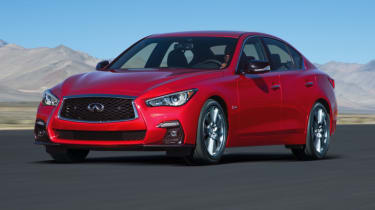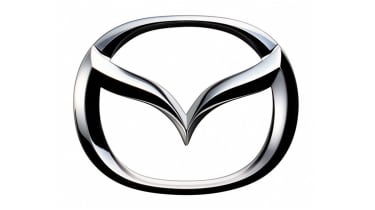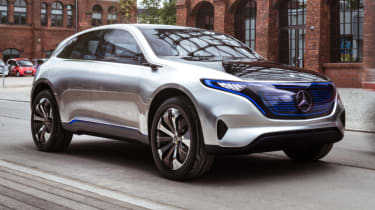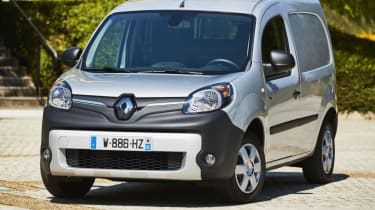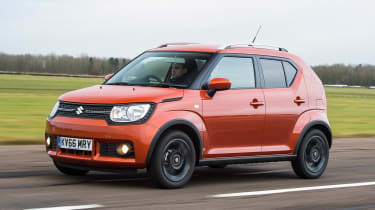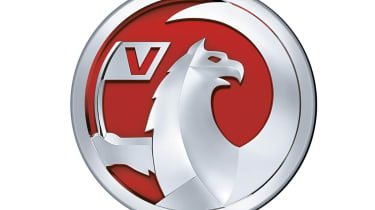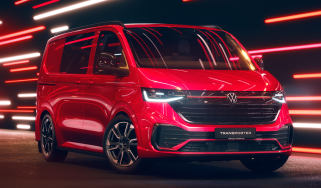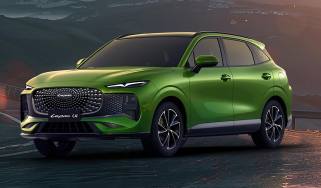New electric cars A to Z: full guide to all the EVs and plug-in hybrids on sale
We talk you through the hybrids, plug-in hybrids, pure EVs and fuel cells on sale and coming soon from every major car brand
Just over a decade ago, hybrids were still niche products, and it looked as if electric vehicles would never seriously get off the ground. How times have changed.
Now, hybrids, plug-in hybrids, pure-electric cars and even fuel cells are big news; nearly every major manufacturer has either entered or is preparing to enter this increasingly lucrative market. But if you’re ready to take the plunge yourself, you need to know which brands have invested in which tech, plus which have something new and exciting on the way.
Our A to Z guide spells out the electrified models all the big names already sell, and what’s due soon. It’s essential reading for any buyer.
New electric cars A to Z
Alfa Romeo
Alfa has no official plans for electrified cars, but bosses have hinted that the Giulia platform, which also underpins the Stelvio SUV, can support plug-in tech.
In 2016, Alfa Romeo Europe chief Fabrizio Curci told us that the structure “is built to support whatever kind of electrification we do”. He added: “It can support everything from plug-in hybrid to full electric.” A new BMW 5 Series rival is also planned to make use of the platform; this should also use upcoming EV tech.
Aston Martin
Aston Martin has confirmed that an all-electric version of the Rapide S, called the RapidE, will be available in 2019. It’s a lot like a standard Rapide S, but features a fully electric powertrain with no combustion engine, and it could deliver up to 1,000bhp and feature a range of 200 miles.
The brand also revealed a concept version of its upcoming DBX SUV with an electric powertrain, which hints at what’s to come for Aston’s first 4x4.
Design director Marek Reichman explained: “The electric powertrain is definitely realistic. It’s an inevitability that emission-free driving will come, and to some customers in the future it will be a requirement. To be sold globally, it will probably need a choice of conventional powertrains, too.”
Audi
Audi wants to be one of the big names in the industry when it comes to electric cars, and its e-tron brand is already well established. The Audi A3 e-tron and Q7 e-tron provide customers with the chance to buy into plug-in hybrid motoring right now, but they are soon due to be joined by an all-electric SUV, previewed by the striking e-tron quattro concept.
It’s set to kick-start a line-up of many new EV models.“The first [of the new models] is an SUV,” Audi boss Rupert Stadler told us at the Geneva Motor Show back in March. “We decided to go the SUV way because, even though the architecture is a little more difficult because you don’t have the perfect aerodynamics, people love to sit in an SUV and we have to respect the growing trend of SUV segments. I think this was two or three years ago absolutely the right decision.”
Even Audi’s performance car range is due to start using electric power, with the next S8 likely to feature a Porsche-sourced plug-in hybrid powertrain. The brand is also entering Formula E in a bid to prove it has what it takes to win at EV racing.
Bentley
British luxury brand Bentley is planning a plug-in hybrid Bentayga SUV, and we’ve spied it in testing. It’s possible the car will use tech from Porsche’s plug-in hybrid range, but there are no official details yet. The powertrain could make it into new versions of the Continental GT, Flying Spur and Mulsanne as well.
BMW
There are already plenty of electric and electrified BMWs on sale, the most obvious being the i3 and i8. The i3 is an all-electric city car that looks unlike any other, and there’s a range-extender version that can be filled up with petrol to keep the battery topped up. The i8 is a sports car that has an on-board three-cylinder engine to deliver huge performance.
There are also electrified versions of some other BMWs: the 225xe, 330e, 530e and 740e are plug-in hybrid 2 Series Active Tourer, 3 Series, 5 Series and 7 Series models respectively. All use an electric motor and a petrol engine to boost range and versatility.
BMW is planning more EVs, along with an entry into the Formula E racing series. An i8 roadster will soon bring the brand into the soft-top electric sports car market as well, while an i5 electric saloon is tipped to join the range in 2021.
BMW’s member of the board responsible for sales and marketing, Ian Robertson, told us that the i5 project is known in-house as the iNext. He said: “I think the iNext phase will have much stronger volume proportions behind it.
“If the next generation of batteries are smaller, thinner and with no wet and sticky stuff inside them – they’re solid state – they can be packaged much easier.”
Citroen
Citroen still sells the all-electric C-Zero, sharing parts with the Mitsubishi i-MiEV and Peugeot iOn. There’s also the Berlingo Electric van, and a Multispace MPV version is on the way. Plug-in hybrid power has been talked about for future models including the C5 Aircross, possibly with around 300bhp.
DS
The DS 7 Crossback was revealed at March’s Geneva Motor Show, with an E-TENSE plug-in hybrid. It mixes a 197bhp 1.6-litre turbo with two electric motors to give 296bhp and up to 37 miles in pure-electric mode.
Also on the cards is a supercar, first hinted at by the E-Tense concept at Geneva last year. Asked about an all-electric high-end sports car, DS CEO Yves Bonnefont said with a smile: “This is a possibility, yes, but it’s far too early to talk about anything.”
We do know that every new DS is being designed with electric power from the start.
Ferrari
Only one Ferrari uses electric power for now, and that’s the LaFerrari hypercar. That links a 6.3-litre V12 to an electric motor, with a focus on performance, not economy – and only 499 have ever been produced.
Fiat
No current Fiat is electrified, but a hybrid 500 is likely by 2020. Fiat Chrysler boss Sergio Marchionne is looking at cleaner drivetrain options, but said: “Putting full hybrids [into small cars] is going to kill you. We need to embrace 48V [mild-hybrid] systems in a more realistic way.”
Ford
For the moment, the Focus Electric and Mondeo Hybrid are the only models in the Ford range with electric power. But many more are on the way.
Hybrid versions of the Mustang muscle car and F-150 pick-up, as well as a plug-in hybrid Transit van, a fully electric SUV and an autonomous mass-market ride-sharing vehicle by 2021 were all promised by then-boss Mark Fields at the Consumer Electronics Show in Las Vegas at the start of this year.
Fields said he wanted the brand “to be a leader in electrification, autonomy and also connectivity”. He has since been replaced in the top by Jim Hackett, but out of interest, Ford also recently registered ‘Energy’ brand names for the Kuga, Focus and Transit, which suggests that hybrid versions of all of those cars could be on the way.
Honda
Honda axed its mainstream hybrid Insight in 2014, so these days its only electrified model is the 573bhp 3.5-litre V6 hybrid NSX supercar.
The brand is planning an all-electric car, using a new dedicated EV platform, for September’s Frankfurt show. By 2030 it wants two-thirds of its global sales to be made up of electrified vehicles – 50 per cent hybrids and plug-in hybrids, with the rest fully electric and fuel cells.
“We will strengthen the development of fuel-cell vehicles as well as battery electric vehicles,” CEO Takahiro Hachigo told Auto Express. “In addition to a China-exclusive model scheduled to go on sale in 2018, a dedicated EV for other regions is under development. We will introduce this at an auto show this autumn.”
Hyundai
The Hyundai Ioniq ticks all the electric boxes, because it’s available as a hybrid, a plug-in hybrid and a full EV. More new EVs are on the table for the brand, though. An electric version of the new Nissan Juke-rivalling Kona small SUV will make its debut next year, with a range of “more than 390km” (242 miles) from a single charge, according to company bosses.
Hyundai has been hard at work on hydrogen fuel-cell technology in recent years, and has just taken the wraps off its next-generation FCEV SUV. It uses liquid hydrogen to produce electricity to power the electric motor on board.
Infiniti
The Infiniti Q50 and Q70 are both available with hybrid power, although the set-up is used to boost output from their large 3.5-litre V6s rather than enhance eco credentials.
Jaguar
The I-Pace SUV concept displayed at last year’s LA Motor Show proved that Jaguar is hard at work on electric power. The wraps are set to be peeled off the production version within the next six months, but the concept was said to be very close to the real thing.
It’s based on a brand new EV architecture that has potential for many more Jaguars using electric technology.
“Designers have been looking forward to electric cars for a long time,” styling chief Ian Callum told us. “They give you permission to do things that you can’t do when you have an internal combustion engine.”
Jeep
Jeep is only just getting into hybrid tech, but its Yuntu concept car at April’s Shanghai Motor Show did feature a hybrid powertrain. It was designed to test the water in the Chinese market, though, so there’s no word on a plug-in from the brand in dealers here yet.
Kia
The Soul EV is the only electric Kia on sale at the moment, but the Niro is a dedicated hybrid, and plug-in and EV versions are also on the way. A plug-in hybrid Optima is available as well, and it caters for buyers after a bit more space. The company’s Stinger sports saloon isn’t even out yet, but there’s already talk of an all-electric model to take on the Tesla Model 3. Plus, as with its sister brand Hyundai, Kia is looking at hydrogen fuel-cell technology for its models in the future.
Ki-Sang Lee, Hyundai’s senior vice president, said: “We are planning 26 eco-friendly vehicles that will be launched to the market before 2020 across Hyundai and Kia. We hope we will be the second vehicle manufacturer in the world in terms of eco-friendly vehicles on the market.”
Land Rover
It used to sell a Range Rover hybrid, but Land Rover no longer offers this in its dealers, and as a result it doesn’t have an electrified car in its range for now. A plug-in hybrid Range Rover Sport has been spotted undergoing testing, although we haven’t had any official word on this car yet.
Platform sharing between Jaguar and Land Rover could see future SUVs from both brands use the EV platform that will underpin the Jag I-Pace first.
Lexus
Every single car in the current range is available with a hybrid powertrain, so Lexus is already a market leader for electrified cars.
The CT hatch and IS, GS and LS saloons all feature the tech, as do the NX and RX SUVs and even the RC and LC coupés. The brand is planning a fuel-cell car by 2020 as well, based on tech from sister brand Toyota. Lexus revealed a hydrogen powertrain at the Geneva Motor Show last year, in the LF-FC concept, saying that the tech is the “ideal choice for the luxury automotive segment”, due to its exceptionally smooth running, long driving range and “outstanding energy efficiency”.
Maserati
Maserati will soon be joining the electric car race, and Fiat Chrysler CEO Sergio Marchionne recently confirmed that all cars the brand makes from 2019 will have some form of EV power.
He called electrification “an integral part of the development of the [Fiat Chrysler Automobiles (FCA)] group”, adding “we [FCA] have been reluctant to embrace that avenue until we saw clearer the path forward”.
The FCA group will press on with an electrification plan that will conclude in 2022, by which time more than half the line-up will be electrified, with Maserati “in particular” championing the change.
Mazda
A small EV is due by 2019 as Mazda works hard on electrification. European R&D boss Matsuhiro Tanaka said: “[A fully electric car] is one of the possibilities we are examining. A small car is best for an EV because bigger vehicles get too heavy with bigger batteries; that doesn’t make sense for Mazda.”
A rotary engine is also on the cards for a future hybrid, possibly in a range-extending capacity. Tanaka told us that a rotary is “very stable and quiet at standard revolutions, so some potential exists for that”.
McLaren
British legend McLaren’s sole foray into electrification is hard to miss – the brand’s flagship P1 hypercar combines battery technology with a turbocharged 3.8-litre V8 engine to deliver 903bhp. The P1 is no longer in production, but McLaren is firmly looking to further electrification in the future with an all-electric ‘Ultimate Series’ car.
Last year, CEO Mike Flewitt told Auto Express that the model will be “the most exciting sports car we have ever made”. By 2022, McLaren says that at least 50 per cent of its models will feature hybrid technology as part of its Track22 plan, with the upcoming BP23 three-seat hypercar to benefit from battery power as well.
Mercedes
Mercedes’ parent company Daimler was an early investor in Tesla, and used battery tech from the US firm to produce the B-Class Electric Drive. The all-electric B-Class, with its claimed 124-mile range, will soon be put out to pasture as the new Mercedes-EQ sub-brand of EVs is launched.
According to chairman Dieter Zetsche, there will be at least 10 new Mercedes electric cars using dedicated platforms under the EQ brand by 2025. Supporting the firm’s efforts will be a new £450million lithium-ion battery factory.
MG
Even brands like MG are getting in on the electrification act. In the near future, it will offer hybrid and pure EV versions of its new XS crossover, plus an all-electric sports car is in the pipeline.
MG hinted at its exciting intentions for electrification at April’s Shanghai Motor Show with the E-Motion concept – an electric sports car with a claimed range of over 310 miles and a 0-62mph time of under four seconds. A production version could emerge before the decade is out.
MINI
MINI played a key role in the BMW Group’s early electrification efforts. In 2009 it introduced the MINI E – an electrified Cooper hatch that never went into full production, but was leased to a select group of road users.
The lessons learned here were applied to BMW’s Project i, which spawned the i3 in 2013. Now, the Countryman S E Plug-in hybrid flies the electrification flag in MINI’s range.
In the future, however, a production MINI EV is planned. MINI has confirmed it will make it to showrooms in 2019, with final assembly taking place at the company’s Oxford plant.
Mitsubishi
It hasn’t revealed a grand electrification strategy like many other manufacturers, but Mitsubishi holds a stake in the EV game and has sold an all-electric vehicle before in the form of the i-MiEV. It was the original car underpinning the Citroen C-Zero and Peugeot iOn, and over 50,000 have been sold globally since 2009. Another electrified sales success has been the Outlander PHEV. With 100,000 registered around the world, it’s one of the best-selling plug-ins ever.
Nissan
The Nissan Leaf was the first mass-produced electric car, and an all-new version is on the way in 2018, promising an extended range and lots more new technology on board. In addition, the brand currently sells the e-NV200 electric van (as well as a people carrier version called the Combi).
A new version of the Juke crossover is on the horizon, and could get a hybrid variant as well. A range-extender hybrid system has already been launched in the Note supermini in Japan, but it has yet to arrive in Europe. On top of that, a new EV supermini to sit beneath the Leaf in the line-up has been hinted at. Nissan’s European EV boss Gareth Dunsmore explained: “We’ve invested $5.4billion (£4.1billion) in electric cars such as the Leaf, so we need to ensure we’re satisfying as many types of customer as possible. “In Europe, that could mean looking towards B-segment hatches [the size of the Ford Fiesta] and SUVs or crossovers.”
Peugeot
The current Peugeot range of electric vehicles is limited to the iOn city car and battery-powered Partner van – although the 508 Hybrid RXH is also available, combining a diesel engine with an electric motor for improved economy.
A plug-in hybrid 3008 SUV is on the way as well, with up to 300bhp. Peugeot product director Laurent Blanchet told us: “The [3008 plug-in] will arrive in 2019, and then we will develop a PHEV for all of our range.”
In the same year, Peugeot will launch an all-electric 208, with power and range capability to rival a Renault Zoe.
Porsche
Porsche is pushing ahead with plug-in hybrid tech, which is already available on the Cayenne SUV and Panamera luxury saloon. The brand has just launched the most powerful Panamera ever, the Turbo S E-Hybrid, which uses a turbocharged V8 engine and an electric motor.
It’s also well on the way to a fully electric car, as previewed by the Mission E concept and the brand’s recent entry into the Formula E race series. A whole range of all-electric Porsches is on the horizon.
Speaking at March’s Geneva Motor Show, company CEO Oliver Blume told us: “The Mission E will sit in the segment below the Panamera. It will offer a 500km (310-mile) range, with a 15-minute charge time. There will be more than one [model], with different levels of power.”
Renault
Renault is working hard to push electric cars as the future of transport, and already has the popular Zoe in its range, as well as the Master Z.E. and Kangoo Z.E. vans.
But the brand is also considering hybrid and plug-in hybrid technology. “We know this is a trend for all markets in all regions,” admitted chief competitive officer Thierry Bolloré. “So all manufacturers including us are considering all options, including hybrid and plug-in hybrid, to adapt to the market conditions. “We have the technology already, of course. We know what to do, it is just an evaluation of the market. But we are ready to offer all opportunities.”
SEAT
SEAT is planning a bespoke electric car, and trademark applications suggest it could be called Born, Born-E or E-Born when it arrives after 2020. The name is taken from El Born, which is one of the trendiest areas of Barcelona.
Another pure EV could be spun off from the Mii city car. This would be a roadgoing version of the SEAT e-Mii we saw at the Mobile World Congress back in February. The other bespoke EV will be based on the VW Group’s MEB electric vehicle architecture and could reach the road by 2021.
Skoda
Also set to create an EV on the MEB platform is Skoda, although because the brand already has a presence in the EV-focused Chinese market, it could build its model before sister firm SEAT. However, Volkswagen’s version would arrive first.
Technical development chief Christian Strube recently told us that Skoda is also considering an EV sports car for 2025, but before then we’ll see a version of the Vision E concept car from the Shanghai Motor Show, as well as an electric SUV.
A plug-in hybrid version of the Superb family car has also been confirmed by bosses at the Czech manufacturer.
smart
Smart has already launched its ForTwo and ForFour Electric Drive, and these EV city cars will be its main focus for the near future. However, a Smart SUV is being considered, and an electric version of that could be offered.
Subaru
Subaru is planning an electric car ready for launch in 2021. The brand’s new Global Platform architecture supports EV tech, so one of the core models is lined up to get the electric powertrain.
On top of this, hybrid versions of existing Subaru models are on the way and are scheduled to arrive in showrooms by the end of next year, hooking battery technology up with the brand’s trademark boxer engines.
Suzuki
A mild hybrid system is already used in some of Suzuki’s cars. The SHVS set-up adds a small electric motor to existing engines in the range, helping to boost power and torque, as well as fuel economy.
Tesla
Electric car pioneer Tesla already has its Model S and Model X on sale, and has firmly established itself as a brand with a focus purely on battery power.
Coming soon is the Model 3, which will rival the BMW 3 Series as a compact executive car, as well as a Model Y SUV of around the same size.
Also planned are trucks and pick-ups, as boss Elon Musk sets out to make his company a world leader in EV tech.
Toyota
Toyota has been at the forefront of hybrid tech for decades; the Prius is one of the world’s top-selling hybrids. Also in the range are the petrol-electric Auris, Yaris, C-HR and RAV4, plus the Prius Plug-in and fuel-cell Mirai.
Toyota also previewed future EV tech at March’s Geneva Motor Show with the all-electric i-TRIL concept car, and it’s launched an “in-house venture company” responsible for developing electric vehicles.
An EV with a 186-mile range by 2020 has been rumoured, but there are no official plans yet. And European boss Johan van Zyl has also hinted at an electric Aygo city car.
Vauxhall
After it was controversially bought by the PSA Group earlier this year – along with its Opel sister brand – any plans Vauxhall had for electric vehicles have been put into question.
An electric Ampera-e city car was suggested, but this could be replaced by a new model using Peugeot’s EV technology instead – possibly in the Crossland X or Grandland X SUVs, which are already underpinned by PSA platforms.
Volkswagen
The all-electric Volkswagen e-Golf is already on sale, alongside the hybrid Golf GTE and Passat GTE models. There’s also the e-up! city car, but the company’s focus in the future will be on its new MEB platform and a range of full EVs.
A Golf-sized car called the I.D. will come first, offering family car practicality without the need for an engine. There will also be an I.D.-branded SUV and even a microbus based on the recent I.D. Buzz concept car.
VW Group boss Matthias Müller said at the annual general meeting back in May that his company “[intends] to be the No. 1 in e-mobility by 2025”.The VW Group is planning to launch “more than 10 new electrified models by the end of 2018”, according to Müller, and he added: “By 2025, we will be adding over 30 more BEVs [battery electric vehicles].”
Volvo
Volvo recently announced a push to electrify its range. It already sells the XC90, S90 and V90 T8 models, plus the new XC60 T8. These all use the same petrol engine and electric motors, and work as plug-in hybrids.
From 2019 every model the brand launches will have an electric motor, either as a mild hybrid or a full plug-in like the T8 cars. Volvo also intends to release five all-electric cars between 2019 and 2021. Three of these, built alongside Chinese parent Geely’s own projects, will be branded as Volvos; the other two will fall under the recently relaunched Polestar Performance badge.
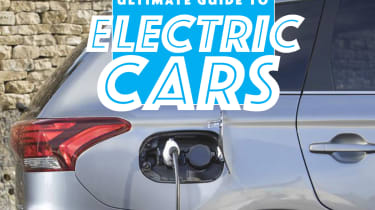
|
Ultimate guide to electric cars | |
| History of electric cars | New electric cars A to Z |
| Could you live with an electric car? | Electric car driving school |
| Can plug-in cars still be fun | |
|
EV technology guides | |
| Hybrid or electric car? | What is Formula E? |
| Hydrogen fuel cell cars | Wireless charging technology |
| What is a hybrid car? | Electric car charging stations |
|
Electric car buying advice | |
| Buying a used hybrid car | Buying a used electric car |
| How to buy an electric car | Cheapest electric cars |
| Best electric cars | Best hybrid cars |
| Best hybrid SUVs | Best plug-in hybrid cars |
| Best tax-free cars | Fastest electric cars |













